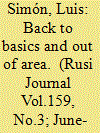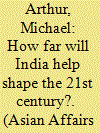|
|
|
Sort Order |
|
|
|
Items / Page
|
|
|
|
|
|
|
| Srl | Item |
| 1 |
ID:
132083


|
|
|
|
|
| Publication |
2014.
|
| Summary/Abstract |
As Allied combat forces return from Afghanistan, Russia's annexation of Crimea has reminded NATO that the security of a rules-based international system in Europe cannot be taken for granted. Efforts to reassure Allies and partners in Eastern Europe have thus become a top priority. This, however, should not lead the Allies to turn their backs on broader, global geostrategic developments - particularly at a time when Asia is emerging as the world's economic and geopolitical centre of gravity. If the West is to prosper in a changing world, argues Luis Simón, it should be able to both defend Europe and project security globally.
|
|
|
|
|
|
|
|
|
|
|
|
|
|
|
|
| 2 |
ID:
132341


|
|
|
|
|
| Publication |
2014.
|
| Summary/Abstract |
In the wake of the BJP's crushing defeat of Congress in the national elections held in May 2014 the author assesses India's prospects and potential in the light of the oft-made comparison with China. India is famously diverse, the largest democracy in the world, with a relatively young population. India is secular, in the sense that state and religion are not linked, but at the same time India is a deeply spiritual society, diversely religious. In all these areas China's experience is wholly different, but not necessarily better, though in purely economic terms China is far ahead of India and Indian underperformance. Nonetheless, India is likely to be just as central to global issues like climate change, the Digital Revolution, public health and migration. In addition, managing all aspects of the relationship with Pakistan will be one of the key issues for 21st century security. In all this, while poverty, caste and appalling governance will hold India back, diversity, tolerance and an entrepreneurial culture should help her forward.
|
|
|
|
|
|
|
|
|
|
|
|
|
|
|
|
| 3 |
ID:
133417


|
|
|
|
|
| Publication |
2014.
|
| Summary/Abstract |
In 1966, in what has become known as the Wilson Doctrine, the Prime Minister, Harold Wilson, informed Parliament that he had issued an instruction that the telephones of parliamentarians were not to be intercepted by the intelligence and security agencies. Subsequent Prime Ministers have all expressed their continued commitment to the Wilson Doctrine. This article examines the nature and limitations of the Wilson Doctrine, and its continued application in the context of recent legislative changes and a number of prominent recent cases. It focuses on apparent changes to the scope and attempts to set aside the Wilson Doctrine under the Blair government and the implications of the interception of the communications of Sinn Fein Members of Parliament, and the bugging of meetings involving the Labour MP Sadiq Khan.
|
|
|
|
|
|
|
|
|
|
|
|
|
|
|
|
|
|
|
|
|